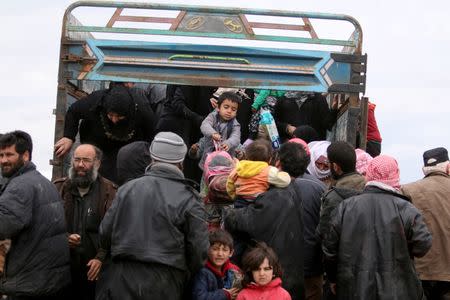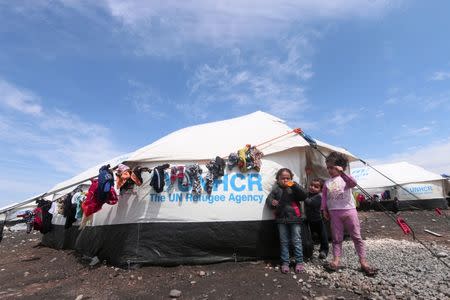EU pleads for aid access as fresh attack hits Syria
By Robin Emmott and Gabriela Baczynska BRUSSELS (Reuters) - The European Union's aid chief called for more humanitarian access in Syria on Tuesday at a donor conference meant to support the country's fragile peace prospects and pressure Damascus to let in aid trucks. As Christos Stylianides spoke at an international conference in Brussels, a suspected gas attack hit Syria's Idlib province, killing at least 58 people. In response to the attack, the EU's top diplomat Federica Mogherini said Syrian President Bashar al-Assad held "primary responsibility". The Brussels came as Syria's civil war enters its seventh year, raging on in large part due to the inability of regional and global powers to agree on how to end it. "Humanitarian access is at a new low due to continued deliberate obstruction by all parties to the conflict," Stylianides said. "You remember east Aleppo, where no aid could enter for months despite our collective calls," he said, referring to the government siege of rebel-held areas last year. "More Aleppos are everywhere in Syria." The United Nations has appealed for $8 billion this year to deal with one of the world's worst humanitarian crises, with millions displaced inside Syria and in neighbouring countries. Qatar and Kuwait joined the EU, Norway and the United Nations to organise the latest international effort following conferences in Berlin, London and Helsinki to raise funds. The European Union has already pledged 1.2 billion euros ($1.28 billion) for 2017. Other governments will come under pressure to make good on promises made in February 2016 at the London conference, which raised $11 billion over four years. EU SEEKS POLITICAL SOLUTION Speaking on the sidelines of the conference, Nancy Wilson, the head of Relief International, said problems providing supplies were chief obstacle on the ground. "You can't run a health clinic if you don't have clean water and medical supplies," she said. "Some kind of political solution that would cease the fighting would be the biggest challenge." Five million Syrians have fled into Turkey, Lebanon, Jordan, Iraq and the European Union to escape the conflict among rebels, Islamist militants, government troops and foreign backers. The future of Assad, backed by Russia and Iran, remains the key point of contention, blocking political talks. The EU says it would not pay for any post-war reconstruction unless there is a "credible political transition" that would give the opposition, moderate rebels and the various ethnic and religious groups a say in Syria. "We caution against paying for Assad's destruction without a political end to the war," said European lawmaker Mariejte Schaake of the Netherlands. The EU called Tuesday's conference to show support for the peace process by bringing together prime ministers, foreign ministers and ambassadors from some 70 countries. The initial U.S. and Russian backing for the U.N.-led process has waned as Moscow now sponsors separate talks with regional powers Iran and Turkey. Washington is now also at odds with European governments. While all used to agree that Assad must go, President Donald Trump has made fighting terrorism his top priority instead. ($1 = 0.9376 euros) (Additional reporting by Farah Salhi; Editing by Tom Heneghan)



